From indentured labourers exported to work on American railroads and Samoan plantations to refugees fleeing the Japanese occupation and beyond; the southern county of Taishan, Guangdong 台山,广东 has experienced an exodus of millions moving abroad since the early 19th century.
For Chunjie 春节, Chinese New Year, Kiwese felt it was time to ship on down to Guangzhou and get on a bus to see her Great Uncle Kan Bong; who has remained in the village where my Por Por was born and raised.
These thoughts from January preclude the following impressions of family, immigration and the pursuit of happiness.
‘Immigrant Song’ – Led Zeppelin (1970)
“Taishan is a little Hong Kong!” “台山是一个小香港!” a local man declared to me on the bus; a sweeping statement met with incredulous head turning and raised eyebrows of disbelief from other passengers. Our use of Mandarin in the Cantonese heartlands rang out sharply like an American accent aboard the Strathmore 44.
I was returning to a place I’d never been before — some think it’s Hong Kong, some think it’s a hole.
The parking attendant sat wide legged on a plastic stool, smoking a tall bamboo bong with a tin can clamped onto the side.
“Xiao Mei! Xiao Mei!” a voice called.
Holy shit. I was being addressed with my given Chinese name for the first time.
Out of instinct, I go in for the hug. Argh — I always forget that hugs are not the done thing here. Already committed, I proceed to give the three awkwardest hugs of all time. Smile, smile, keep smiling. So many different titles for addressing family members. Heard once and promptly forgotten. Thankfully, I had the main ones down – Kan Bong was my Kiew Gong 舅公 and his wife was my Jiu Por 舅婆.
Kan Bong, a stoic, stony-faced former-water buffalo herder of 77-years-old. Characterised by navy blue worker jacket and daily packet of 12mg cigarettes. Jiu Por, a lovely little lady, recorded in my journal as “fuggin’ cute.” Suffers from chronic foot pain, particularly at night time. She went into details with me one evening, pointing at her heel while we were boiling water for bathing, quietly stoking the flames of the wood burner, “aiya, ayo…” I prodded her heel and frowned. Neither speak Mandarin (Pùtónghuà 普通话).
Wan Lin is the eldest daughter, the one who takes on the greatest sense of duty in family matters. We’d spoken to a few times on the phone, following my first fail call to the village (Jiu Por picked up, couldn’t understand, hung up). She has the best Putonghua out of all the adults. Her husband, referred to here as Mr. WL, is a smiley, balding chap. Good banter, despite his mish-mash Mandarin rambles that his daughters’ would giggle at under their breath. They work seven days a week selling sports and kids shoes at the downtown market, selecting them through a dealer on QQ and making the 5am bus journey to Guangzhou. It’s tough work against online shopping, Mr. WL says. They couldn’t get away for the family feast on chuxi 除夕 (New Year’s Eve).
Kan Bong’s only son, referred to here as Uncle, a tanned, quiet man, who works part-time in a local factory. Enjoys cigarettes and cellphone games. His wife, Aunty, has an absolute cracker of a laugh. Primary family cook, forever embattled with her son’s difficult behaviour, chief chicken slayer. There is another daughter, but she has immigrated to Boston and rarely makes the journey back.
The Mei Meis, or 妹妹们, who I will call Lil Mei (12yo) and Elder Mei (15yo). Enjoy cellphone games and Cantonese soap dramas. So young, so screened. I pressed hard for their other hobbies, saying ‘cellphone’ was not a hobby. Both are under an immense load of school work. Lil Mei showed me a primer of 75 ancient Chinese poems which need to be committed to memory by the end of the holidays. Of course, there is an enormous fine for having a second child. Wan Lin says Elder Mei takes on a lot of responsibility because of their tough working hours. The sisters keep each other in great company, whacking each other and laughing.
Last and least, Biao Di (16yo), a total zháinán 宅男, stays inside on the computer all day, talks back to elders. Gets away with murder as a boy. Dragged him out on an excursion to buy new clothes and shoes for the New Year. It was a tough day. Aunty howled.
The two families live about one minute walk away from each other in typical apartment blocks with stone stairs and no elevators, while Kiew Gong and Jiu Por had caught the bus in from the village.
(Click images to enlarge)
The old TV set hummed away, screening soap operas in a dialect everyone understood but me. “Sorry, I can’t speak Cantonese,” I blushed in Putonghua, the language of the classroom, my few basic phrases from childhood steamrolled flat by the New Zealand accent. “We speak Taishanhua 台山话 (hoi san wah), it’s different from Cantonese,” Wan Lin said, “but it’s good we are able to communicate!”
WHAT. Massive revelation, I thought my family spoke Cantonese this whole time… In some ways, it felt like my years of language study had come down to this. Other cousins and aunties that have visited in the past have done so through tour groups or translators, they said. I was the second to come alone. The first was my Mum, thirty five years ago, when it took a whole day and three boat trips to get from Taishan to Guangzhou.
I brought out some photos as an icebreaker and validator of our relationship. Kan Bong could identify all my aunties and uncles by their Chinese names, remarking somewhat wistfully at the number of children and grandchildren. Translations from Taishanhua to Putonghua ping-ponged around the room, to the English names in my head. Aunties I’ve known my whole life as ‘Gee’ and ‘Beatle,’ suddenly had these alter egos as ‘珠莲’ and ‘月莲,’ existing in another language, another form. Everything felt closer.
Kan Bong via Mei: "You look a lot like Qiu Lian." Me: "Oh, who is Qiu Lian?" Everyone: "...your Mum." #lol
Taishan. Meat being hacked up in the back of a truck. Paper money burns in a brazier. Steaming dim sum. A family ripping out goose feathers in a pool of blood on the street. Mahjong blocks clatter away from an apartment block. “You should’ve seen this place eight years ago!” Mr. WL exclaims, waving a cigarette about, embarking on a barely intelligible Mandarin-Taishanhua monologue about the town’s development. Elder Mei sits glued to her cellphone, QQing her friends about her infinite boredom.
Within an hour of arriving in Pang Jeel, I saw a chicken have its throat slit open and its head yanked backwards. Blood blurted into the stone gutter by the back door, accompanied by one final squawk. Moments like these remind me how much of a city kid I am. Selecting pre-plucked, pre-cut, pre-packaged poultry from the supermarket and tossing them into my trolley, detached from the life and death of the animal. Upon later discussion, the aunties said chicken needs to be purchased either live or whole, otherwise people will think there’s something wrong with it.
I ate at least one chicken leg and one goose leg at each meal while in the village, they rained down upon me from all corners of the table. I was the guest, and they are the most coveted pieces. My second-cousin scowls with an acidic hiss of Taishanhua, to which no one translates or pays attention to. I have been stealing his chicken legs. Jiu Por chuckles, chopsticking another drum of poultry into my rice bowl, her white teeth gleaming upon her round, wrinkled face.
We set out early to Wan Lin’s house for tāngyuán 汤圆, glutinous rice balls in a sugary sweet soup. She smiles, extending a bowl towards me, we eat them in order to bring “tāng tāng yuán yuán,” she says. Chá 茶 (tea) is lovingly prepared by Mr. WL in a tea set atop the living room table; dousing each implement with boiling hot water before commencing. Wan Lin presented bowls of hot water to the traditional Chinese deities around the home, of which there are many. The apartment is sparsely decorated, the statues are the primary form of ornamentation. Mr. WL loves tea and speaks about it at length. And in the evening, he loves báijǐu 白酒. I, however, am not offered any báijǐu. Blessing or a curse?
“Ah, those three old guys are familiar,” I thought, recognising the long beards and pastel-coloured porcelain robes. Wan Lin says they are Fú Lù Shòu 福禄寿; figures of prosperity, status and longevity. She later mentioned Por Por came to get a set of her own during her visit to Taishan in the early ’90s. These conversations with Wan Lin were wonderful. These memories of family, our ability to share and communicate in Mandarin – each anecdote, no matter how big or small, building a richer, warmer picture of this heritage in my mind.
The bus ride to Pang Jeel was in two parts. The first of which had an extremely ill, emaciated person with thighs about the width of my forearm and a face so sunken you could see the bones protruding from his skull. He was wearing some scraggily old rags and his skin was caked in permanent dirt. After sitting down, he lost a sandal amidst what appeared to be an epileptic fit. Of course, no one blinked an eye. It was truly horrible, frightful scene to witness.
A villager lit up a cigarette aboard the old, grunty vehicle with torn up seats and plastic stools in the aisle. Deftly stumbling along the dusty roads out of Taishan, a ticket lady with a baby strapped to her front asked where we were going and took our fare money. A 20-something-year-old punk kid in a leather jacket with chains pierced into his ear dragged himself off the bus with a sigh, standing motionless at the archway to his village. Chunjie, the biggest chore for the unmarried youth of China.
Lil Mei says she threw up on the last bus trip to the village. Wonderful. Sitting side by side listening to her Canto-pop with an earphone each, my thoughts whisked back to the dreaded ‘windy bit’ from Wairoa to Gisborne, where the three of us would turn green in the back of the Previa while Mum flipped her Jimmy Cliff cassette tape for the umpteenth time. There was a non-genealogical connection between our two lives, engrained in the vomit-inducing routes to our grandparents’ houses.
Pang Jeel village is about 30 minutes out of Taishan. Stone brick houses, separated by narrow alleyways and chicken hutches, where people have their doors open at all times. Stone gutters run down the sides of the alleys, emanating the stagnant smell of washing up, chicken blood and refuse.
Kan Bong’s quaint, two-story abode is located in the thicket of these alleyways. A wooden flap door opens into the front room, where eating, sitting and other living is done. The next room has two sinks; one for food preparation and washing, the other for brushing teeth. Two bamboo ladders stretch up to an internal balcony with two small doors veiled by curtain fabric. Food offerings are presented on a wooden table beneath the mounted cabinet of lamplit statuettes. A plastic door houses the showering area. The wood burner crackles away in the back room which opens out onto the back alley, where Kan Bong’s geese (already slaughtered, eaten) bob around in a stone walled garden. Public squat toilets sit near the archway. The kids and I sleep upstairs in two bedrooms.
There is one xiǎomàibù 小卖部 (dairy) in the village. Kan Bong took us for a walk; hands clasped behind his back, cigarettes in his breast pocket. It charmed me to see the Mei Meis talking with their grandfather, something I wasn’t able to do with mine. The village opera stage sits unused with stone seating set into the ground. I could picture what the venue would be like during an event. Lil Mei showed me the fields with veggie patches that the locals look after collectively.
Jiu Por brings round hot hóngshǔ 红薯, sweet potatoes, in a plastic bag. We roasted them in the earth in the cabbage patch at the back of the village, along with eggs coated in mud from the stream that assaulted the nostrils with the distinct smell of shit. The somewhat unpalatable truth is that the mud from the stream was in fact, shit.
Step-by-Step Canton Hangi!
The feast was similar every meal. Tofu skin soup, cabbage, sweet potatoes, stir fried vegetables, Kan Bong’s favourite: Toishan sweet and sour pork, with a freshly slaughtered chicken and sometimes an é 鹅 (goose) added for each sitting. “Southerners eat é, Northerners eat yā 鸭 (duck),” they say, “é is much tastier than yā!” they say. I nod. “Màn man chī 慢慢吃!” (“eat slowly,”) Jiu Por would repeat, one of her only Putonghua phrases. Eating till you are full is so important to the older generation, who have lived through famine, food rations, crop failures and hardships that I will never know. The elongated aaa’s and laa’s, aunties’ infectious laughter cracking the air sharp as a whip.
In May 1940, my Ye Ye, paternal grandfather, Ng Carr Yam immigrated to New Zealand aboard the ship “Awatea” to Wellington, reuniting with my great-grandfather, who had been Poll Taxed upon arrival almost two decades prior.
Boluotang village is my Ye Ye’s ancestral home – a mere five minute walk from Pang Jeel. The name got endless lols from the Mei Meis for it sounds remarkably similar to bōluótāng 菠萝汤 (pineapple soup). Kan Bong led the pack on this treasure hunt for my lǎojiā 老家, family home, the only clues lay within the scrawled names of my zúpǔ 族谱, family tree, our map for navigating the remaining, elderly residents of Boluotang. Kan Bong’s deep voice, tall stature and free flowing cigarettes commanded a sense of purpose.
Dialect game was strong. Toothless grannies yaaaing and waaaing at me in some form of Cantonese. Elder Mei would translate when I asked, but some of it was incomprehensible as the dialect is different in every village. A dude in Guangzhou later claimed the reason there are so many variations in Taishan is because each village changed their tones during the Japanese occupation, afraid that the soldiers would be able to understand them.
Led by a tiny, alfalfa-haired old man, we were led to the home of the oldest person in the village and found a chubby smiley woman inside. Success, the lǎojiā of Ye Ye’s brother was just next door — abandoned and crumbling. The roof had fallen in, ferns were growing out of the floor. No one had lived there for years. The convoy had grown remarkably since our quest began, everyone clattered over broken roof tiles and piled into the back room – waa laa yaa! Very surreal feelings, being in that space.
Across the alley was another house of some significance, the skeleton of a home full of rubble. From what I could gage, it was my Ye Ye’s old home. A man and his sister who knew Ye Ye’s brother guided me into the rubble of the front room and told me about how they all used to play together when they were kids, that they were such happy times. Their Putonghua was rough, but I was glad we had something to grasp onto. I nodded and smiled. The Mei Meis had floated off to play with a puppy, their translation hours over.
Aunty took me for a spin on the motorbike to see some “gǔlǎo fángzi古老房子,” “ancient houses,” at Méi Jiā Dà Yuàn 梅家大院, the set of blockbuster film Let the Bullets Fly 让子弹飞. Whizzed past abandoned factories and towns with dwindling populations. With workers moving to Guangzhou and Shenzhen, areas like these are have become almost ghostlike.
A table of mahjong ladies unsuccessfully shooed away a lion dancer, reluctantly pausing their game while it made a enormous racket in front of their home. At night, we clambered on the roof to watch fireworks from nearby villages light up the black sky. Jiu Por cracked up at my red dragon nightie.
The fireworks started going off really early. It must’ve been 4 or 5am. And they are bloody loud when you live in a draughty stone house with wooden doors. Lil Mei sprung out of bed with Christmas Morning enthusiasm, begging me to “kuài qílǎi, kuài qílǎi! 快起来, 快起来!” “get up, get up!!” Bleary-eyed and firecrackered into consciousness, I scuffed my way downstairs to find all the adults waiting in the front room with red packets (hóngbāo 红包). Remembering the rules from childhood: take it with two hands, say Goong Hey Fat Choy, smile and thank. Haven’t got one since I was a kid, it was awesome.
Drums and gongs could be heard all over the village, as the lion dance (wǔshī 舞狮) criss-crossed through the alleys to bàinián 拜年 at every door; flailing about and bowing three times. Jiu Por prepared the offerings atop a red plastic stool: a hóngbāo, a hóngbāo shaped firecracker, a bowl of raw rice, a little cake and a mandarin. The lion was performed by two men; one with the head and one holding the tail. Another would collect the rice in a basket hooked on the end of a bamboo pole slung over his shoulder. The toughest job appeared to be that of the fetcher, who had to run ahead and grab the hóngbāo, light the firecrackers, throw them in the path of the lion and scram. Deafening. A drummer, a drum dragger, a cymbal clanger and some substitutes who followed along with plenty of durries. The whole affair takes well over two hours. I followed the troupe for a long time and ended up with a splitting headache. Perhaps that’s why everyone in the village talks so loud, tinnitus after decades of Chinese New Year.
The TV was always switched on and is easily the most widely digested media here. And it is utter crap. In one show, two white guys were trying to imitate exemplary aspects of Chinese culture, then failing in a slapstick way. So cringe. Presented CCTV agenda: 1) Haha! White people are stoopid! 2) We Chinese are inimitable! 3) THIS IS CHINESE CULTURE. Ridiculously cheesy ads on repeat, targeting the millions of old people sitting at home. A faint but piercing, high-pitched noise hummed out beneath the soap operas. Firecrackers were sporadically exploding at the door. My offers to help in the kitchen were rebutted with a “no, no, just sit and watch television!” Short of Mr. Wormwood forcing Matilda to watch TV with the family, after several days it became a rather insufferable activity.
People flitted between each other’s homes to bestow New Year’s greetings. Plastic bags of fruit and sweets were shipped around in a Pass the Parcel type ritual; the persistent ‘take it, take it!’ followed by long, obligatory refusals. The same bag of oranges moving from home to home around the village. This social dance, all executed in urgent yelps of Taishanhua. A jolly old man from the next village hops into our unmarked taxi, yarning about how he had prepared all the ancestral offerings at the shrine, but had to go back because he forgot the chopsticks!
Some migrants return to Taishan and bear stories of their new lives abroad, spreading the gospel of the Promised Land.
And everyone is a believer.
The topic of living abroad came up frequently. Wan Lin laughed that a friend who started a restaurant in the U.S. said she could do egg fried rice or “suíbiàn chāo 随便抄” “random frying” and the laowai would lap it up for outrageous prices. It was enriching to hear these perspectives. Moving abroad would mean better wages and fúlì 福利 (welfare), better housing, a clean environment, less pressure. As I listened, I kept wanting to emphasise that it’s not that easy to just slip into a new life abroad, but found the words curdling in my mouth; the words of a third-generation beneficiary of immigration that has been able to reap the rewards of hardship.
My Por Por’s father was shot dead for being a land owner. She and my great-grandmother had to collect his body from the scene, take it home and bury him. For decades, my grandparents worked themselves to the bone in pursuit of a better life. Isolation, culture shock, language barriers; all in an effort to plant roots in a New Zealand that doesn’t want your kind. I think about the things I’ve been able to enjoy in life and feel conflicted with a headful of appreciation and guilt. They work for low wages in markets and factories and want their kids to have a better life. Who am I to say “it’s not easy”?
I see them, my Taishan family, the one’s who never left, sitting on plastic stools in a humble lounge around an old TV set; three generations of their family are all together; chatting, healthy, alive. My grandparents have all passed away. Kan Bong is 77-years-old and looking after rabbits in his back garden. What’s the basis of a better life? Longevity? Quality? What even are those things? I take a self-timer of all of us together, they pack me some snacks for the bus and we say goodbye. Lovely, generous people.
From the roaming chickens of Pang Jeel village to the enormous skyscrapers of Guangzhou, the bright lights and sounds of the big city confront me. Accompanying me back to the bus station, Wan Lin said they would like to buy a small car of their own one day, but it will take a lot of saving; a lot of shoe sales. In Guangzhou, a glossy luxury car billboard with a sleek new vehicle model parked in front encourages consumers to Make the Change. ♦






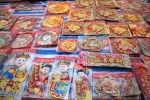


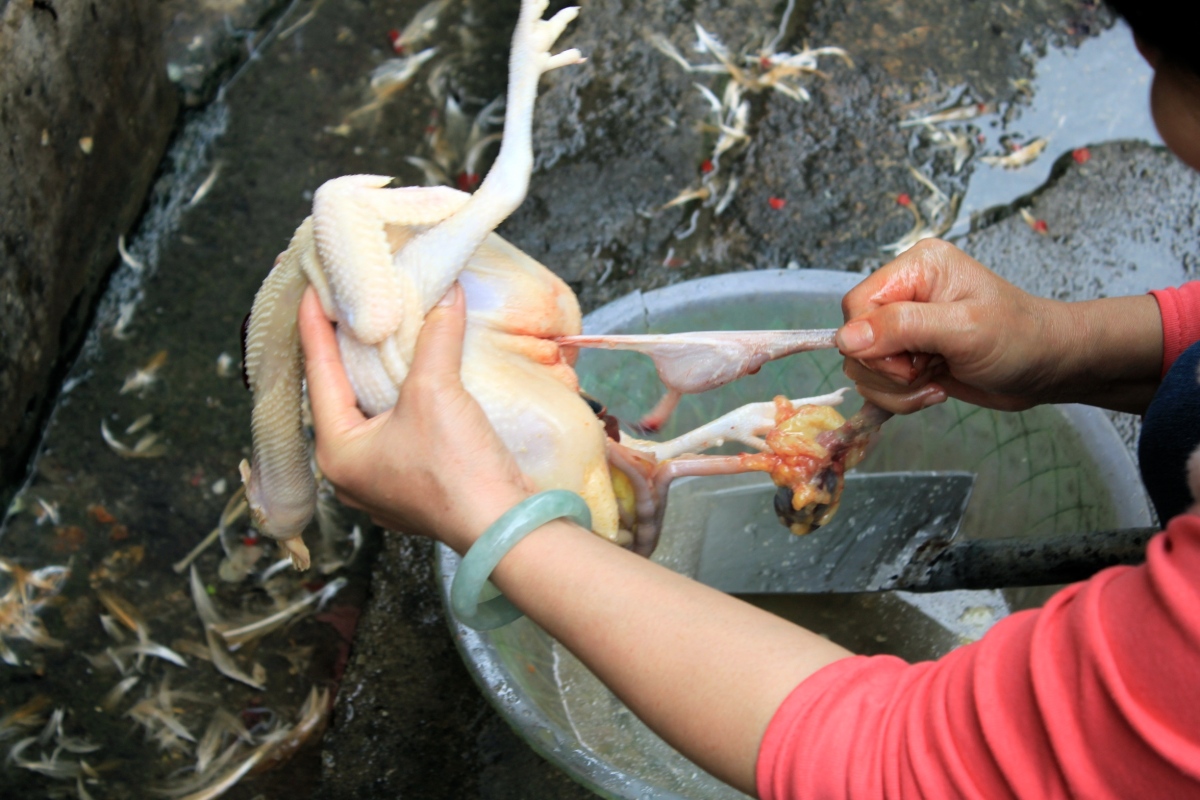

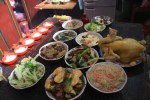
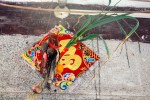



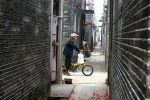
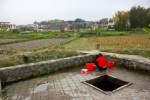


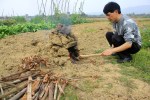
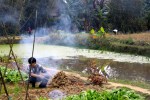
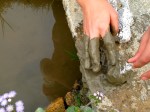
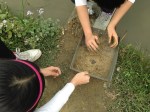








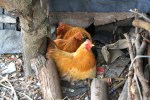

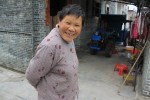
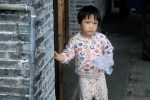


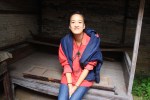






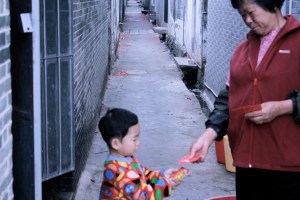




[…] I was searching for my roots in Guangdong, piecing together the family puzzle that scattered with the dropping of Japanese bombs. Robin helped to fill in the blanks of the stories I was never able to ask my grandparents. […]
LikeLike
[…] As the guest and honoured teacher, both grandparents chopstick endless supplies of meat (not vegetables) into my rice bowl with Chinese New Year like intensity. […]
LikeLike
[…] Ayi Wan Lin phoned on the weekend. Forgot to reply to that text, flicked it away for later consideration while the eternal online shopping hole of Taobao was draining my essence. […]
LikeLike
I heard you on RNZ a while ago, and have been looking at your blog. Much as I like the music stories, I just love this post. Thanks for sharing it.
LikeLike
Cheers Barry! Hope to write more about roots and heritage soon.
LikeLike